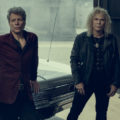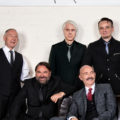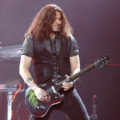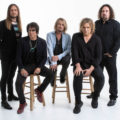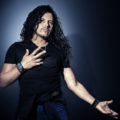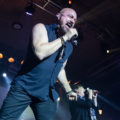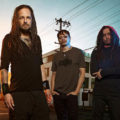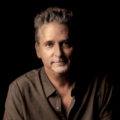Supergrouper Tony Franklin, from The Firm and Blue Murder, to VHF’s “Very High Frequency”
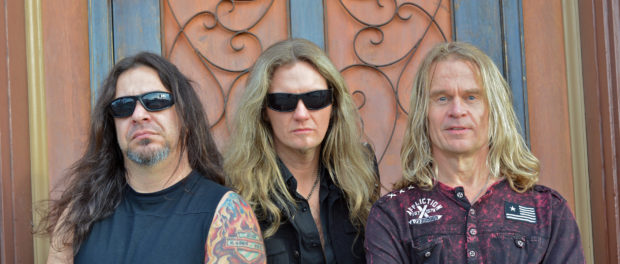 Photo provided by Golden Robot Records
Photo provided by Golden Robot Records
To those who didn’t scour streaming services and stumble upon VHF’s undeservedly obscure debut, “Very High Frequency,” in 2014, the groove-centric instrumental rock trio may as well be a brand new band.
However, the players who represent those initials are all quite seasoned in their own right, including guitarist Joel Hoekstra (Whitesnake, Night Ranger, Trans-Siberian Orchestra, Cher, Broadway’s “Rock Of Ages”), bassist Tony Franklin (The Firm alongside Led Zeppelin’s Jimmy Page, Bad Company’s Paul Rodgers and AC/DC’s Chris Slade, Blue Murder with Whitesnake’s John Sykes) and drummer/author Todd “Vinny” Vinciguerra.
Thankfully, they get another shot at international attention now that Golden Robot Records is reissuing the adventurous album on June 25, which was built from the drums onward with each subsequent part being crafted individually and virtually (all done by choice prior to becoming pandemic-forced commonplace).
The super friendly Franklin phoned Chicago Concert Reviews with the blueprints for this unconventional creation, falling in love with fretless playing, being a distinctive member of what’s now a long line of supergroups, plus previewing what’s bound to be a mesmerizing memoir.
 Walk us back to how VHF started.
Walk us back to how VHF started.
Tony Franklin: It’s a fascinating process really, because this was done remotely before remotely was a thing and it was a deliberate choice. Vinny reached out to me and to Joel. He’d known Joel before. I don’t know where the connection with Vinny and myself came from other than him loving my work and thinking it would be a great fit. He had this concept, and I give him full credit for it, where the sounds are built from the groove and the drums up. He discussed it with me and I said, “yeah, I think that could be one of those things could really do nothing and be awful [laughs] or it could be fantastic.” With these kind of players, it was worth an experiment to see how it would work. So he laid down a bunch of drum grooves and then left it completely wide open to me with no input whatsoever, or foresight, or structure, or anything. Now I have to say some of the structures were quite unusual, but I saw it as a bit of a challenge to come up with something that basically makes sense of that structure.
Can you give an example?
Franklin: For instance, “Suspended Animation,” one of my favorites, [has] a cool, almost Zeppelin, but modern kind of feel on the front end. Then half the song is this slow section that goes on almost the rest of the song. I came up with this descending pattern that just keeps going and going. You know how [The Beatles’] “I Am The Walrus” just keeps ascending? This one is the opposite. It keeps descending deeper and darker into a black hole. A lot of the musical structure and the melodic structure came down to me, and I personally love doing that. Then we sent it off to Joel, who I had not met before. I ended up doing two of his solo albums and a bunch of different things with him. We became good friends through this and he went to town on the VHF stuff…Joel did lots of different instruments and layers, almost pseudo-vocal things and narration. I was very excited once I heard Joel’s parts come together. We didn’t know if we were going to do anything with it, to be honest. It was just one of those experiments. We ended up making some videos and now it’s getting the right treatment with Golden Robot.
Did you swap feedback and make any changes prior to the final versions?

Photo by Ed Spinelli
Is there anything you hope to communicate with sounds since there are no words?
Franklin: For me, music is always about being on a journey and it’s gotta keep you engaged. It’s gotta keep you almost hypnotized. One of my favorite bands, of course, is Led Zeppelin for that. Every song takes you on a musical journey. It’s almost very picturesque. You can draw your own imagery from it. If anything, I always like to take people on a journey that holds them, captivates them, hypnotizes them and takes them somewhere during that time, so I think we achieved that. The beauty of instrumental music is it leaves it wide open for a lot more interpretation.
Where do you think this project will fall in line with fans of The Firm?
Franklin: I never really think that way, cause I’ve been involved in so many bands and projects. It’s like, “where did Blue Murder fit in with The Firm?” It really didn’t. The thread is, I suppose, the fretless bass from my side of it. Everything’s a continuing musical journey and artistry is always evolving, so that’s another aspect of it all. I have so much I want to say and express creatively. It’s another part my painting box and all the different colors. Remember The Firm was 36 years ago now, so I’ve come a long way. You grow or change as an artist. You have different influences and inspirations, and different things going on in your life, so it’s another painting along the way.
Many feel your playing was just as distinctive as Jimmy Page’s in the band. What made you fall in love with fretless bass in the first place and how has it benefited you?
 Franklin: Thank you. I was 11-years-old when I first started playing bass, and then in the late ‘70s, I heard [Weather Report’s] Jaco Pastorius for the first time and that was an awakening moment. “Wow, I didn’t realize a bass could have that presence, sound and feel to it,” so I had to have a fretless bass. Jaco was the spark. I realize I’m not really a jazz player. I didn’t really learn his stuff, but I took his spirit [of being] very driving [with] a great groove, sound and feel. I’m essentially a rock player, so I just brought the fretless bass into rock…I got my first fretless bass in ‘79, but it really wasn’t until ‘83 really that I was starting to [think], “okay, I’m where I want to be now.”
Franklin: Thank you. I was 11-years-old when I first started playing bass, and then in the late ‘70s, I heard [Weather Report’s] Jaco Pastorius for the first time and that was an awakening moment. “Wow, I didn’t realize a bass could have that presence, sound and feel to it,” so I had to have a fretless bass. Jaco was the spark. I realize I’m not really a jazz player. I didn’t really learn his stuff, but I took his spirit [of being] very driving [with] a great groove, sound and feel. I’m essentially a rock player, so I just brought the fretless bass into rock…I got my first fretless bass in ‘79, but it really wasn’t until ‘83 really that I was starting to [think], “okay, I’m where I want to be now.”
Bear in mind, The Firm got together in ‘84, so I had not made the fretless bass my voice too much before The Firm. I’d done some things with [English folk rocker] Roy Harper and Jimmy Page before that, and then it just came together beautifully with The Firm. That was the only bass I took down to the rehearsals and nobody said anything, so I just kept doing it. In hindsight, I didn’t think about it. I just was doing that, but it became a nice identity and a different flavor for that band. With Jimmy and Paul, it added a different dimension without being, you know, it just fit. It was just the way that things naturally evolved and flowed.
I love the fretless bass because of its freedom of expression. I liken it to the human voice. It can express itself, but you don’t think about it. The voice is a very spontaneous thing and so is the fretless bass. It’s not thinking this is a novelty instrument where you do all this sliding around just because you can. It would be like overusing an effects pedal or it would get annoying. It still has the role to play of holding down the low end and maintaining the groove. But the fretless gives me those little subtleties and expressions where I can be happy or sad on the bass and express it musically without the limitation of frets. The frets sometimes make it, for me, very precise and very accurate, losing some of those subtitles and expressions, so that’s what I love about the fretless.
You also toured with Whitesnake, are in VHF with their current guitarist and worked with a previous one in Blue Murder. Is this all coincidental or is there a specific Whitesnake thread that runs throughout this band?
Franklin: I toured with Whitesnake in 1997, so there’s a big connection there. Of course John Sykes, Blue Murder, co-wrote a lot of the ‘87 album, the breakthrough album in the U.S. At the end of the day, it’s a very small business. More and more these days, especially the collaborations that have been going on, it’s just inevitable. You end up knowing a lot of people and you cross paths in different ways. It’s cool and I think VHF is just more coincidental than anything else, but it adds an interesting element to it.
 How did you wind up in so many supergroups?
How did you wind up in so many supergroups?
Franklin: I don’t know how it happens. I guess it’s like anything, isn’t it? You’ve just got to do the best you can and be good to be around. Then you keep busy and different things come your way. I honestly don’t think about it too much. Things come along and you either do it or you can’t do it. I was actually asked to join Pink Floyd at one point before Blue Murder, but I was unable to do it. That was a tough day. I had to turn that down. It’s funny [with] all the colors. We’ve got blue, we’ve got pink and we’ve got white, but I haven’t been with Black Sabbath, so I haven’t got that color, or Deep Purple [laughs].
What are the prospects for a possible VHF tour?
Franklin: We want to explore this music and we would love to do it. I’m also aware that instrumental has a harder time drawing in an audience. We’re already working on the second one. There are some vocal bits on it, which Joel did. He just took it upon himself cause of that wide open palette. We could do whatever and make it more accessible, but still within the creative, open palette. I definitely would love to because The Firm, Blue Murder, all those bands, as we played, the music expanded. It took on a new life. It was like having new musical conversations every night, so I would love to have the opportunity to do that. We’ll just have to see and that’s why we’re excited to get the album out cause it’s a step closer. You never know or maybe we can get an opening slot with a band. I remain open to all of that.
Did any Chicago shows along the way really stick with you?
Franklin: Honestly, The Firm holds so many fond memories for me. We played the Rosemont Horizon there. The Firm had its own plane, and we would frequently make a hub of the major cities, and then fly out. Those were the days when you did not have to go through security, just drive, [then go] straight into the plane. So Chicago was a hub and we were probably there for two weeks. I have fond memories of Chris Slade and I sitting in the lobby before we left for the gig drinking black coffee and playing backgammon.
The Rosemont was such a great gig and just loud. All the crowds were loud. [I’ll never forget] that first time in any of the big cities, coming to L.A. playing at The Forum, playing Madison Square Garden with Jimmy Page and having a bass solo. Just me on stage at Madison Square Garden! It has been hard to top that. That was me at 22, 23, 24-years-old and the highlights were back then [laughs]. I’ve had plenty of others since then, don’t get me wrong, but that one really does stick with me because it was just done at the highest level and it was the first time for me. It was magical and will always remain that way.
Are any of your previous groups going to get back together? What about other projects you’re in the process of working on?

Photo by Ed Spinelli
Can you let us in on the kind of stories we’ll be reading about?
Franklin: It’s really a reflective, introspective journey. I’ve seen so many ups and downs in life and the music business. Last year was a weird year for many of us musicians of course, but to me, I’ve seen so many extremes, it was just another chapter and so you get very resourceful. You ride the storms of life’s ups and downs, but more than that, I want to tell a story. I want it to be like my music where it’s very hypnotic and you go on a journey with it where all the things that happen, all happen for a reason. There’s interconnections and life flows in a way that is almost mystical, but with a positive twist on it through it all, interspersed with great rock & roll stories.
I never talk dirt about anybody, but I can tell some fantastic stories from the road and all that. I’m not one to put anybody in a negative light. I don’t believe in that. Everybody’s got dirt on everybody else. It’s kind of one of those unspoken laws about rock & roll. But also, the making of The Firm and Blue Murder albums, insight about how it all got together, how it ended and how life’s journey has carried on since then. Yes, there was some pain, some near death experiences and some spiritual moments. Meeting and seeing Jaco Pastorius in 1985 with Jimmy Page and seeing them jam [was a highlight]. I’ve been privy to so much information, some hard knocks and all of that, put together in a fascinating, hopefully uplifting story that is just full of rock & roll magic, stories and all that good stuff.
For additional information on VHF, visit Facebook.com/VHFtheband.

